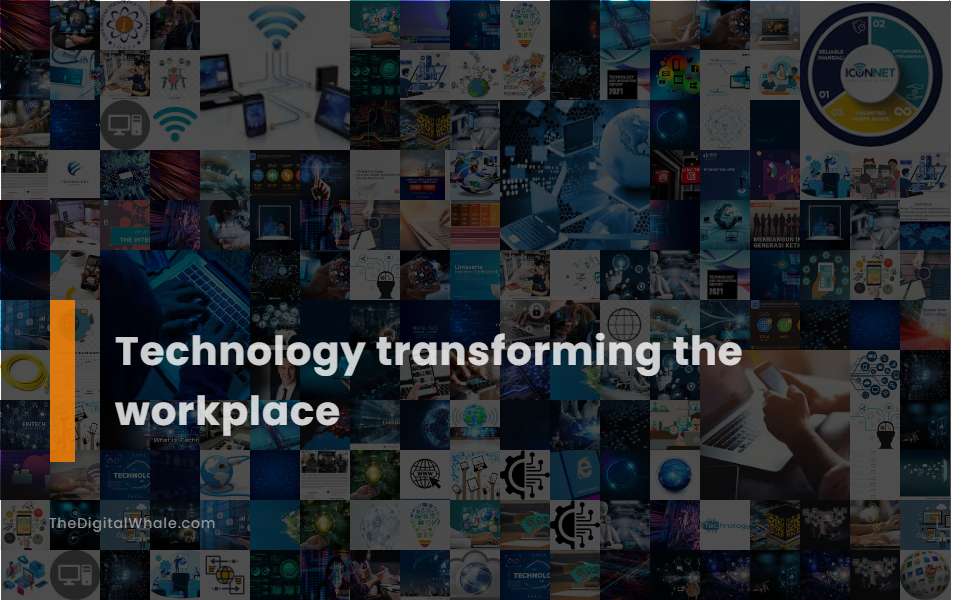Technology Transforming the Workplace
What trend is currently impacting the workplace the most? What new workplace technology is transforming the way we work? Let's find out more about Technology Transforming the Workplace.

Transformation of Workplaces: Technology has fundamentally changed the way we work, communicate, and collaborate.
Technology has fundamentally changed the way we work, communicate, and collaborate, enhancing productivity, flexibility, and efficiency through advancements like remote work, AI integration, and cloud-based collaboration tools. This transformation has redefined the modern workplace, enabling global operations, streamlining workflows, and fostering a culture of continuous learning and digital literacy. For more insights on this transformation, you can explore how [new technology has affected the modern workplace](https://www.yarooms.com/blog/how-has-new-technology-affected-the-modern-workplace) to understand its comprehensive impact.
Remote Work: New technology enables flexible and global work arrangements, breaking geographical barriers.
The advent of new office technology has significantly revolutionized remote work by providing access to digital collaboration tools, cloud computing, and virtual workspaces. This transformation has paved the way for flexible and global work arrangements, enabling employees to work seamlessly from anywhere, thus breaking geographical barriers and enhancing productivity. Crucially, remote work has transitioned into a mainstream employment model thanks to high-speed internet and sophisticated collaboration software, which facilitate instant communication and global connectivity. These advancements are not only reshaping the future of employment but also promoting a balanced work-life dynamic. For more detailed insights on this evolving landscape, you can explore how Technology Is Transforming The Workplace.
Automation and AI: Streamlining operations, automating manual tasks, and enhancing productivity with AI tools.
AI is revolutionizing the workplace by streamlining operations, automating repetitive tasks, and enhancing productivity through technologies like machine learning, natural language processing, and robotic process automation. This technological advancement allows human resources to focus on more strategic and valuable tasks. In streamlining business processes, AI plays a crucial role by automating manual tasks, analyzing data, and making intelligent decisions. This leads to significant improvements in operational efficiency, particularly in areas such as supply chain management, finance, and accounting, where AI can forecast demand, optimize inventory, and automate financial tasks. This progress enhances operational efficiency by aiding in data-driven decision-making and personalizing customer experiences. For further insights into how AI can [enhance operational efficiency](https://sixtysixten.com/streamline-business-operations-with-ai-work-smarter/), substantial cost savings, and improved satisfaction can be achieved. Such advancements showcase the growing importance of AI technology in modern business practices and its capacity to transform traditional workflows.
Enhanced Communication: Instant and global communication through apps, video conferencing, and messaging tools.
Technology has transformed workplace communication by enabling instant, global, and collaborative interactions through messaging apps like Slack, Rocket.Chat, and Google Chat, as well as video conferencing tools like Zoom, which facilitate real-time communication, file sharing, and seamless collaboration across different work environments. These tools streamline communication, enhance teamwork, and support hybrid and remote work models by providing features such as real-time chat, audio and video calls, and secure file sharing.
Improved Efficiency: Automation reduces time spent on repetitive tasks, allowing focus on strategic activities.
Automation in the workplace significantly improves efficiency by streamlining repetitive tasks, allowing employees to focus on more meaningful and strategic contributions, and enhancing overall business performance through reduced operational costs and increased productivity. For more insights on how technology is reshaping the way we work, visit the modern workplace article on YAROOMS.
Related:
What is the impact of the Gig Economy on labor market trends? What is the gig economy? Let's find out more about The Gig Economy and Its Impact On Careers.
Flexible Work Environments: Cloud-based technology supports remote work and diverse workforce needs.
Cloud-based technology facilitates flexible work environments by enabling seamless collaboration, improved accessibility, enhanced data security, and optimized spending, making remote work more productive and efficient. As outlined on Natural Networks, technology, including cloud computing, virtual collaboration tools, and advanced communication platforms, supports remote work by allowing employees to work from anywhere. This not only reduces overhead costs but also increases access to a global talent pool, thereby enhancing productivity and employee satisfaction.
Device-Agnostic Workplace Technology: Ensures seamless connectivity and access to business applications across various devices.
Device-agnostic workplace technology ensures seamless connectivity and access to business applications across various devices, fostering a flexible work environment, enhancing collaboration, and promoting a more inclusive and collaborative work culture. Embracing these advancements, businesses can read insights on creating the Workplace of the Future to stay ahead in today's rapidly evolving digital landscape.
Advanced Analytics and AI: Providing business insights, handling complex tasks, and improving decision-making.
Advanced analytics and AI are transforming the workplace by automating repetitive tasks, enhancing productivity, and providing strategic insights through the analysis of vast amounts of data, thereby improving decision-making, employee engagement, and overall business efficiency. AI algorithms process large datasets to uncover patterns, generate predictions, and offer meaningful insights that drive better decision-making and strategic planning.
Smart Virtual Assistant Apps: Organizing schedules, automating tasks, and enhancing efficiency with AI.
AI-powered virtual assistants are transforming the workplace by automating repetitive tasks, organizing schedules, and enhancing efficiency. They streamline processes such as scheduling meetings, managing calendars, and handling customer inquiries, allowing employees to focus on strategic initiatives and high-value activities. For a deeper understanding of how these technologies are reshaping modern workspaces, you can explore the [Smartdev website](https://smartdev.com/how-ai-powered-virtual-assistants-are-enhancing-efficiency-in-the-workplace/), which provides insights into the pivotal role of AI in boosting workplace productivity.
Cybersecurity and Data Management: Secure remote access, data protection, and streamlined workflow integration.
Secure remote access in the modern workplace involves technologies like VPNs, multi-factor authentication, and zero-trust approaches to protect data and resources from cyber threats. Meanwhile, data protection measures such as encryption and compliance with regulations like GDPR and CCPA are crucial for safeguarding personal and company data. To delve deeper into how these advancements are revolutionizing the workplace, visit the Yarooms Blog for further insights.
Related:
What are the most common skills gaps that HR professionals face in recruiting? What are the skills gaps and how do theyaffected workers, firms, and the economy? Let's find out more about The Skills Gap and Its Impact On Career Paths.
